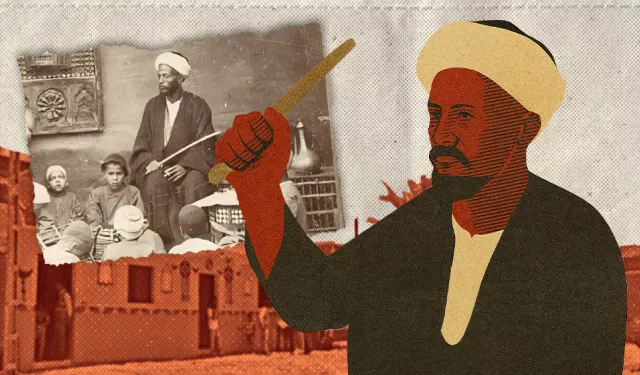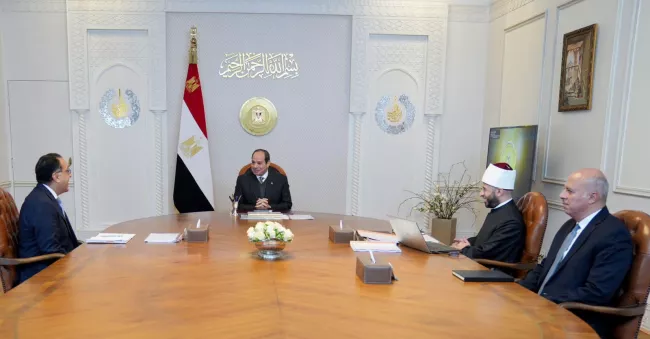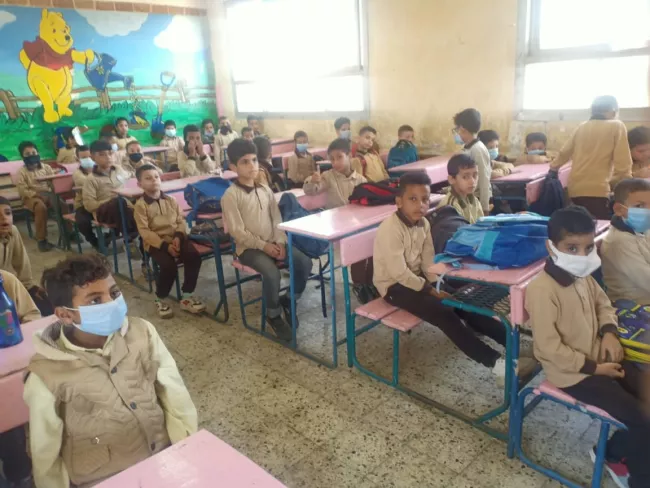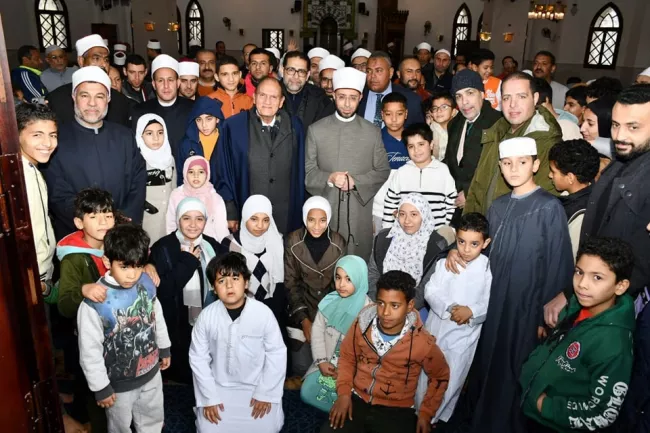
The kuttab: An alternative to the state education system?
Traditionally tucked into the corners of mosques or village homes, the kuttab was once a cornerstone of pre-modern education in Egypt—where children, seated cross-legged on straw mats, memorized verses of the Quran under the steady gaze of a local sheikh.
Dating back to the early centuries of Islam, the kuttab was a foundational institution for education across the Arab and Islamic worlds, including Egypt. Emerging as informal study circles before evolving into structured settings within mosques, homes, and public spaces, kuttabs offered accessible instruction in Quranic recitation, literacy, and basic numeracy.
In Egypt, their proliferation soared during the Fatimid and Mamluk periods, when state and charitable endowments supported religious and civic education. By the 19th century, under Muhammad Ali’s modernization drive, kuttabs were gradually integrated into national schooling systems—but retained a symbolic and practical role, especially in underserved rural areas
Though largely sidelined by formal schooling in the 20th century, this modest institution is now reemerging—not as a relic, but as a proposed remedy to the failures of Egypt’s public education system.
Believing that “all the problems in education in this country, and with schools no longer playing a real role in actually teaching children,” Heba Riyad chose to enroll her son in the local kuttab.
From the outset, Heba acknowledged that the kuttab is not a full-fledged educational system capable of equipping students with a comprehensive knowledge base. However, she enrolled her son, Yassin, out of the conviction that he will “at least learn to read and write,” as she told Al Manassa.
Her decision to enroll her son, who is in his first year of primary school in Al-Khawaled village, Qena governorate, isn't an isolated act of parental improvisation. It aligns, whether consciously or not, with a state-level policy shift.
Last May, PM Mostafa Madbouly announced presidential directives to study a proposal from Minister of Religious Endowments Osama Al-Azhari to reinstate kuttabs as part of the education ecosystem.
Madbouly emphasized that the curriculum in these revived kuttabs would focus on “the foundational values of the Egyptian state—moderation, tolerance, respect for others, love of the homeland, and respect for all religions.”
In December, Al-Azhari launched the “Return of the Kuttab” initiative during a visit to Kafr Sheikh Shehata village in Menoufiya’s Tala administrative district. There, he unveiled the first model kuttab and praised the role these spaces once played in shaping religious and national identity.
In his view, the kuttab was never just a place to memorize the Quran; it was a formative institution that shielded young Egyptians from the “dangers of extremism and atheism.”
The magic bullet
The initiative seeks to establish at least one kuttab in each of Egypt’s 4,500 administrative villages, with further expansion planned over a 12 to 18-month rollout. Can a centuries-old model designed for religious instruction adapt to the demands of modern education, and can it support—or even substitute—a school system widely acknowledged to be in crisis?
For Ruqiya Mohamed, the answer is no. Her son Mostafa is in his second year at Sheikh Ahmed El-Amir Primary School in Assiut, and she has opted to teach him herself. “The schools can’t offer a real education,” she says flatly.
The numbers back her up. In many public schools, class sizes are unmanageable. “There are over 80 students in Mostafa’s class,” Ruqiya explained. “He couldn’t grasp what the teachers were saying, and most of them couldn’t communicate the material effectively with so many kids crammed in.”
As an Arabic Language graduate from the Faculty of Education, Ruqiya dismissed the kuttab as insufficient, choosing instead to be her son's primary instructor. “There’s no way it can teach him everything he needs, especially languages,” she explained.
Education in retreat
The education crisis extends beyond overcrowded classrooms, exacerbated by a consistent downward trend in government spending. Despite Article 19 of Egypt’s constitution mandating at least 4% of GDP for education, actual spending has fallen to just 1.94%, according to a report by the Egyptian Initiative for Personal Rights.
Acknowledging the depth of the problem, President Abdel Fattah El-Sisi has openly questioned whether Egypt can afford to meet its constitutional commitments. He stated, “You tell me we have constitutional entitlements to health and education. Can the Egyptian state afford to provide proper education for 25 million people? That would require over 500 billion pounds.”
He continued, “To give a child an education like they do in respectable countries, you need $10,000 per student. That’s $250 billion. Where will I get that from? Where will Egypt get that from? The numbers just aren’t there. We have to live in reality.”
Teacher shortages significantly compound the crisis. By the beginning of the last academic year, Egypt had added 98,000 new classrooms, yet this expansion only widened the shortfall. The country now lacks an estimated 665,000 teachers.
Ashraf Amin, a member of Parliament’s Education and Scientific Research Committee, called the situation “a disaster threatening future generations.”
The Ministry of Education, he adds, has paused hiring of teachers and resorted to stopgap measures—part-time hires, temporary contractors, and even enlisting student volunteers for public service. “It’s all palliative,” Amin warned. “These are just band-aids for a hemorrhaging system.”
MP Hanan Yashar, also on the education committee, agreed, citing systemic problems like underfunding, overcrowding, teacher shortages, and low salaries. She remains unconvinced that kuttabs are the solution. Instead, she told Al Manassa, the priority should be real reforms addressing the education sector's structural problems, emphasizing that no matter their support, kuttabs cannot replace schools.
Return of the kuttab
Osama Raslan, spokesperson for the Ministry of Endowments, said the kuttab project will operate under the ministry’s supervision across all governorates and will be “complementary to the role of the Ministry of Education, not a replacement for it.”
He explained that the kuttab is similar to the preschool programs attached to primary schools, “but it differs in that it focuses on Quran memorization and the basics of reading and writing.”
Raslan stated that the ministry aims to establish a kuttab in every village by utilizing annexes of mosques. “The kuttab will be equipped with modern audio-visual teaching tools,” he said, adding that future expansions could include subjects like history, geography, philosophy, psychology, and sociology.
In February, the Minister of Endowments inaugurated the Sheikh Ahmed Nuaina kuttab at the Ahabab Al-Mustafa Mosque in Shorouk City. It was the second official launch under the Return of the Kuttab initiative, following the initial pilot in Tala, Menoufiya.
Currently, enrollment is free, but Raslan indicated that the ministry may later introduce a small monthly fee. “This would help cover the salaries of instructors, provide educational materials, and support the establishment of more kuttabs,” he said.
Raslan noted that the ministry is not solely funding the initiative. “The kuttab in Tala was built by the Al-Menna Charity Foundation, and citizens funded and now maintain the Sheikh Ahmed Nuaina kuttab,” he said.
“We will establish kuttabs as a ministry, but we welcome cooperation with charitable organizations,” he added. “So far, we’ve received nearly 2,000 applications from villages.”
However, he emphasized that not every application is approved. “We have specific requirements. The location must be structurally and hygienically sound, equipped with modern educational tools, and the instructor must be qualified and capable of dealing with children,” he said.
The ministry currently employs 2,872 certified Quran instructors, who are trained in the latest teaching methods at its centers.
As for overcrowding, Raslan says class sizes will be capped at 50 students per kuttab. “Smaller groups mean more effective learning,” he argues.
Consulting society
Experts are divided on what value, if any, kuttabs can add to Egypt’s troubled education system.
Ashraf El-Shihy, former minister of higher education and scientific research, believes the program could help restore religious and national values. In an age of cultural fragmentation, he said, kuttabs might help children resist the forces of globalization and “cultural invasion,” and even assist in reducing illiteracy.
But he urges caution.
The initiative, he said, needs a broad-based public discussion. “Right now, it’s hard to convince parents to send their children to a kuttab. You need to win people over, and that means making sure the educational methods are sound,” he explained.
However, education expert Buthina Abdel Raouf finds herself more skeptical.
In an era of digital learning and globalized information, she said, kuttabs may struggle to remain relevant. While she concedes that they could provide a focused setting for basic literacy, she doubts they can deliver a comprehensive curriculum.
“These spaces might work for families who want a religious education or who live in areas the state has neglected,” she said. “But they’re no substitute for basic education.”
Instead, she argued, the Ministry of Education should invest in quality early childhood education in underserved villages, stating, “Give these areas proper kindergartens with trained teachers and a nurturing environment. That’s how you build a generation that can really learn.”
Others, like Naglaa Ahmed from Sohag, are torn. “I don’t mind sending my daughter to the kuttab in our village,” she said, “but how can she go there to learn things she’s not getting in school? It just feels like the state is throwing parents in every direction without offering real solutions.”
While Naglaa believes the priority should be equipping schools with the necessary infrastructure and technology, Heba has already made up her mind, asserting, “Yassin will continue at the kuttab until the new school year starts, so he can get a solid foundation.”
In today’s Egypt, the past is not only prologue—it’s policy. And the kuttab, once an ancient solution, is being summoned again to fill a very modern void.


